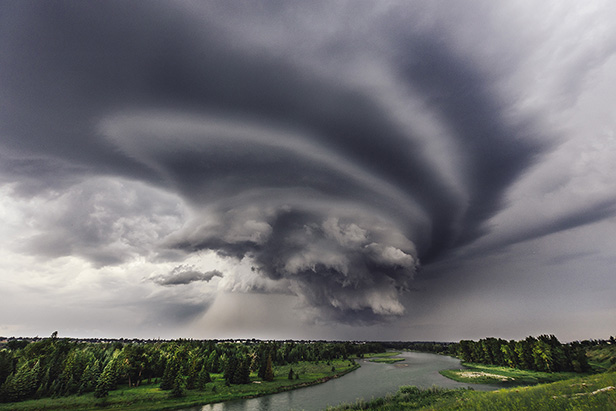
Severe weather across Canada continues to highlight the financial costs of a changing climate to both insurers and taxpayers. Insured damage for severe weather events across Canada reached $2.1 billion last year, according to Catastrophe Indices and Quantification Inc. (CatIQ). Noteworthy severe weather events last year included the November flooding in British Columbia and summer hailstorms in Calgary, and 2021 now ranks as the sixth highest in insured losses since 1983. According to Munich Reinsurance Company, 2021's global losses from natural disasters hit $355 billion.
Insured Damage for Severe Weather Events in 2021
| Date | Severe Weather Event | Damage |
|---|---|---|
| January 12 | Western Canada storms | $134 million |
| March 26 | Eastern Canada storm | $50 million |
| June 30 | Lytton, BC wildfire | $102 million |
| July 2 | Calgary, AB hailstorm | $500 million |
| July 15 | Barrie, Ontario-and-area tornadoes | $100 million |
| July 22 | Prairie storms | $120 million |
| August 2 | White Rock Lake, BC wildfire | $77 million |
| September 7 & 22 | Southern Ontario storms | $105 million |
| September 11 | Hurricane Larry in Atlantic Canada | $25 million |
| November 13 | British Columbia floods | $515 million |
| December 11 | Eastern Canada windstorm | $152 million |

Canada's Top 10 Highest Loss Years on Record (loss and adjusted expenses in 2020 dollars)
| Rank | Year | Total loss ($ billion) | Notable severe weather event |
|---|---|---|---|
| 1 | 2016 | 5.403 | Fort McMurray, Alberta, fire |
| 2 | 2013 | 3.511 | Alberta floods; Greater Toronto Area floods |
| 3 | 1998 | 2.562 | Quebec ice storm |
| 4 | 2020 | 2.297 | Fort McMurray, Alberta, flood; Calgary hailstorm |
| 5 | 2018 | 2.176 | Multiple events: Ontario and Quebec rainstorms and windstorms |
| 6 | 2021 | 2.011 | Calgary hailstorm; British Columbia floods |
| 7 | 2011 | 1.787 | Slave Lake, Alberta, fire and windstorm |
| 8 | 2012 | 1.495 | Calgary rainstorm |
| 9 | 2019 | 1.416 | Multiple events |
| 10 | 2005 | 1.335 | Ontario rainstorm |
Sources 1983--2007: IBC, PCS Canada, Swiss Re, Deloitte. 2008--2021: CatIQ.
"Canada must now prioritize climate defence. A National Adaptation Strategy, currently under development, must propose measurable and concrete actions to protect Canadians by 2030. The 2022 Federal Budget should allocate robust funding to implement this Strategy if we are to protect Canadians from the flood, wildfire, heat, wind, and hail events already growing in frequency and severity," said Craig Stewart, Vice-President, Federal Affairs, Insurance Bureau of Canada (IBC).
"Climate change is real, and the fatalities, emotional turmoil, and financial consequences we've recently witnessed must be a call to action -- we must adapt now. Achieving net zero emissions by 2050 is a foundational step to limit our future risks from climate change, but we need funded measures implemented immediately to protect us from the worsening severe weather that is already happening. Canada's national climate plan will remain incomplete until such measures are identified and implemented.
"In today's world of extreme weather events, the new normal for yearly insured catastrophic losses in Canada has become $2 billion, most of it due to water-related damage. Compare this to the period between 1983 and 2008, when Canadian insurers averaged only $422 million a year in severe weather-related losses."

The insurance industry has been advocating for action on flooding for years. IBC's advocacy on its National Action Plan on Flooding resulted in the federal government establishing the Task Force on Flood Insurance and Relocation in late 2020. The Task Force commenced its work in January 2021 and is scheduled to submit its final report by spring 2022.
IBC is also a member of the national coalition Climate Proof Canada, which is advocating for adaptation as part of the national climate plan. The insurance industry has dedicated funding for, and supported the development of, the Institute for Catastrophic Loss Reduction and the Intact Centre on Climate Adaptation. In the absence of reliable flood maps, the industry also funded Canada's first national flood model. In addition, IBC is engaging with senior Government of Canada officials about rebalancing disaster assistance and insurance to improve consumer outcomes.

